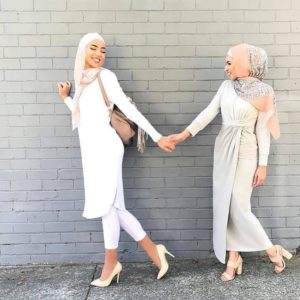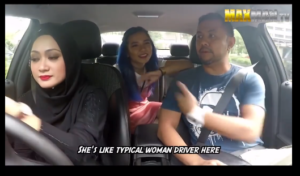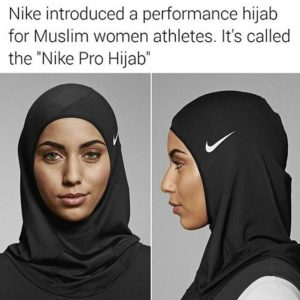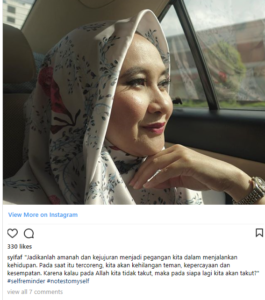Are Muslim women challenging stereotypes on online communities?
Abstract
The purpose of this paper is to demonstrate how Muslim women are challenging stereotypes and prejudices. Muslim women have been confronting negatives stereotypes on online platforms since a very long time. The paper talks about the stereotypical portrayal of Muslim women in the media. More specifically, emphasizing on how are they challenging these issues. The paper supports scholarly articles from the Curtin library. One of the article is ‘the veil and Muslim women’s identity: Cultural pressures and resistance to stereotyping’ by Sen and Wagner (2012), they believe that despite wearing the veils Muslim women can achieve their dreams and ambitions. Another article talking about the emancipation of women wearing the ‘hijab’ is ‘Rethinking Muslim and the veil’ by Bullock. Moreover, it is important to highlight the study of Yvonne as she states ‘Emancipated Muslim women contributions’. Furthermore, ‘Confronting Prejudice against Muslim Women in the West’ will be discussed by Sotlani, 2016. The articles is about how the Muslim women are resisting and being able to challenge these stereotypes.
Introduction
Truly the Muslim women are struggling to present themselves as other women of the world. Is it necessary for Muslim women to portray themselves as emancipated females? Yes. In this new era many changes are being occurred. Therefore these women are considered to be on the right path. Despite being victim of prejudices, the Muslim women are struggling to portray themselves as modern women living in the Western world.
Firstly the introduction will integrate the discussion of the stereotypical portrayal of Muslim women that is how the media and political discourse tag them as weak and oppressed and how the veil is seen as a controversy issue. Secondly supporting arguments which will showcase how Muslim women are resisting and defending themselves that is the stereotypes are being challenged with time. Focusing on , online communities being a platform where online forums are being organized to encourage these females to be emancipated, secondly women wearing the veil are seen to be modern and stylish and thirdly how Muslim women being role models such as singer, you tube vlogger and fashion model uses platforms to challenge stereotypes.
Identity is a vital concept in the society. Identity refers to the sense that someone has of who they are and what is the most important about them. In this new era gendered performance on social media is becoming a controversial issue, especially for the minority group which are the Muslim women. ‘There is no gender identity behind the expressions of gender… identity is per formatively constituted by the very ‘expressions’ that are said to be its results’, (Judith Butler, 2014).
To begin with, the stereotypical portrayal of Muslim women and prejudice theory is seen as a polemic. Media has thrown a very stereotypical light over Muslim women since a long ago. They are seen as weak, inferior and oppressed in the society. Rochelle Terman (2017), states that Muslim females are associated with political violence and terrorism in different media outlets. Therefore these media portrayals influence public opinion about them. Public opinion data reveal growing anxiety about Islam’s compatibility with “Western” values of tolerance, acceptance and civility (Panagopoulos 2006), and people who believe that Muslims remain culturally distinct are more likely to have negative attitudes about them.
According to some research, the American coverage represents the Muslim women as being inaccurately as ‘anti feminists’, which reinforce stereotypes of female Muslim as a treat to Western culture. The Americans have already been victims of several attacks and explosions therefore they reluctant when a woman with the veil appear before them.
This picture was taken by an American photographer from the Washington Political University, stated that Muslim women were opressed and were beaten on the streets.

Retrieved from political university, 2014 .In the last three decades, a big theory has developed commenting Western portrayals of Muslim in the society. Since the attack of 9/11 the Muslim culture are purposely being stereotyped as ‘terrorists’. American media discourse is purportedly obsessed with Muslim women’s oppression, for which the veil is the ultimate symbol and case in point (Ahmad 2009). Popular media outlets portray Middle Eastern and Muslim societies as uniquely or particularly misogynistic, especially compared to Western countries (Kumar 2012).
Supporting Ideas
Awareness online campaigns
In this new era stereotypes are being challenged. Firstly, these Muslim women are breaking the ‘oppressed Muslim woman’ stereotype by improving their own behavior, that is they are interacting more and more with members of the non- Muslim ethnic majority. In addition to, they are representing themselves in a more modern and emancipated citizens. The Muslim females are changing the dominant image in the society. Despite of existing stereotypes Muslim women are facing these challenges with courage and pride. The females from the minority group are participating in Islamic organization where they recognize their religion to be as important as their identity. Moreover, they are challenging the perceptions of Muslim women in the Western society. Different research were conducted to examine how they are changing the image of Islam. They engaged themselves in a way to convince the society that they have the same rights as everyone in the society. All human beings should be well treated with the same rights and equality.
They are emphasizing that all Muslim women should seek education and have the opportunity to develop their skills and talents on the labor market. Furthermore, campaigns and forums are being organized on online communities to promote women empowerment and to positively sensitize people about Islamic women. They are interpreting themselves as being the Islamic feminists, as a result the females are engaging themselves on social media platforms to challenge these stereotypes. For example, ‘Al Nisa’an online group association formed and gathered Muslim women on social media platforms where they could participate and engage themselves on online debates. Additionally these women gave interviews and made awareness videos on online platforms. As a result the public could engaged themselves through the likes, comments and shared posts. For example the words of Zainab, a young Afghanistan who is active on this online association stated that, ‘women have to get a much more active participation in society. […] Be more active, simply like, ‘I am Muslim’. Be proud of it, and make it known to the world: ‘Yes, I wear my hijab, but it doesn’t stop me from anything. I participate actively in society and I haven’t left my religion to be able to do so’ (Mashri, 2014).Focusing on the online group association where Muslim youth is being promoted. They encourage youngsters to not to get involved in criminal and illegal activities otherwise they will damage the reputation of Islam. According to the ‘Young Muslims Agency’, young adults are being online ambassador to make sure to behave contrary to negative expectations. As online forums are being frequently organized on web 2.0 the citizens are reminded how to behave in the society according norms and regulations.
Resistance of the ‘hijab’
They are able to defend themselves as they acquire religious knowledge which leads to live a pious life which therefore form the key to Muslim’s women emancipation and hence breaking the stereotypes. Butler states that many females who showcase themselves on an ambassadorial role should portray an effort of ethical self-fashioning. It is noteworthy to notice that all women are willing to present themselves as positive citizens in the society. Furthermore, Muslim women would dress themselves in a stylish way. For example when posting a picture on social platforms they would deliberately choose a more fashionable ‘hijab’ style. In a way they will be more emancipated as well as restoring their culture. As demonstrated in this picture, where they posted it on social media.

Retrieved from Pinterest, Muslim women wearing the veil and jeans in Western countries.
The present minority illustrate cultural diversity, permeability and shifting boundaries (Khan, 2000). A new image is being showcased on media platforms they are being viewed as courageous and independent women. For example, the Yemeni Nobel Peace Prize winner Tawakkol Karman and Egyptian activist Asmaa Mahfouz, who are both wear the veil. They are sometimes categorized in certain Western feminist organization. These women have written books such as ‘Muslim women speak about dreams’, ‘Under Western eyes: politics of Feminism’, (Chandra, 2009). The media portrayals of Muslim women is evolving with time. Focusing on women wearing the veil has more involvement on television, in films and on social media. To challenge this irony, Anna Piela an author from ‘They call me Muslim’, states that “I am just doing my bit to promote modesty: ‘hijab’ self-portraits on photo-sharing websites,” This picture has been posted on websites to show case the modernity and diversity of Muslim women.

Retrieved from, ‘They call me Muslim’
Nowadays women are being motivated to follow their aims and ambitions. The ‘hijab’ is still considered as a threat in the society, despite all these prejudices these women are resisting social constraints and reconstructing new identities for themselves. For example, there are several Iranian women who are working in the broadcasting media. Studies have been proven that they are efficient workers. There have been many controversies that female Muslim cannot drive they are seen weak and stupid drivers unfortunately this is not the case, these prejudices are being challenged and these women are proving them wrong. This Muslim woman works in a Western country where she drives a car and is called a ‘Uber driver’ and is earning a living.

Retrieved from Account Facebook, 2018
Citizens are accepting her efforts and see her as a normal person earning money in this lucrative business.
Another good example to showcase how Muslim women are resisting stereotypes is how Hijabers are challenging these prejudices.

Retrieved from Journalistic reviews, 2017
Muslim women are challenging the stereotypes of Muslim female as being submissive and disempowered through fashion conscious on global communities. Nowadays they are creating an image of the ideal modern Muslim women. These hijabers observed their cultures as well as visible on social platforms. These women are presented everywhere on television, in advertisements, soap operas, in adds endorsement as well as they are brand ambassadors of products and services. As demonstrate in the picture below.

Retrieved from beauty brands, 2017
Moreover, the states are encouraging athletes from the minority group to have the chance to participate on International level in sports. This is pushing the women to achieve their dreams and ambitions. Furthermore they are restoring their culture as well as being stylish in a practical way. This picture when taken when this girl participate in the Olympics.

Retrieved from Olympics, Nike 2017)
Nike have promote this product on social media where glamourous models wore this ‘Nike Pro Hijab’ on the ramp. They also promote this product through face to face gathering and hijab wearing tutorials. Moreover, Alila a researcher states that Muslim women who travel and work are very inspirational about the Quran. Therefore while posting their images on Instagram they mix together images and moral messages in the description. For an example, Syifa Fauziah appears to be healthy and leading a positive lifestyle where sunlight is gently falling across her face and she has perfectly posed. The accompanying message reads: “If we don’t fear Allah, who then will we fear?” (shilaf,2016)
Muslim women as models on different platforms
Muslim women are emancipated and wish to climb the social ladder. Long ago they were reluctant to share their opinions and point of view in front of the camera but in this diversifies and modernized world they prefer to voice out in order to acquire their rights. Marjon Carlos (2017), talks about a young Muslim poet who uses social media and fashion to challenge stereotypes. This Muslim girl from Brooklyn named Riya Hamid is combating a massive mission around her Muslim faith. When she was a child she was dressed by her mother who comes from Bangladesh, with time Hamid decided to challenge her cultural double standards. She started to gain confidence and started to view life in a more diversified way. She explained about her investments in her visual presentation helps articulate a Muslim woman’s passions when the society are against. She has the control about her content sharing that is she decides the image she disseminates of herself to the world. Moreover she learned how to mix her heritage and music to create her personal style. She was very traditional and believed in modesty. Her parents never introduced her to music and arts. When she was a child she wasn’t allowed to show her skin and was bullied at school. She was portrayed as a typical Muslim passive woman in the society. But now with time shifting and the introduction of web 2.0 Riya is bold and confident in how she looks. She is the type of woman that isn’t afraid of wearing a form-fitting dress despite having wide hips and large breasts. Moreover, she dressed herself in a particular way where better solidify her identity and become more conformable with her appearances. Moreover she is able she is perceived as a role model on Instagram. She is the girl of tomorrow where modern values are dictating. She is a famous Instagram poster. She has stated that she is the one distributing and consuming media. She also can control the content that appears on your feed instead of the media dictating what you should see, and my feed was just filled with brown bodies. I realized, ‘Wait, I spent most of my life feeling unattractive because of Eurocentric beauty standards and my struggle with body dysmorphia is still constant and aggressive. I can take all the selfies I fucking want.’ (Riya Hamid, 2017)

Retrieved from Riya Hamid,2017
Another example of a Muslim woman who is setting an example is a young lady from the feminists associations, Mennel Ibtissem, she won over the jury on the French TV show the ‘voice’. Furthermore, The French daily Le Figaro considered her turban a more modern way of wearing the veil “It is inseparable from my look. You will never see me without it,” she said, drawing a parallel with French rapper Maitre Gims who never removes his dark glasses. (Middle East eye, 2018). Several hijab wearing female singer has tried their luck on this platform. One of them is Amina Skhiri a psychologist who participated in 2016. She is still fighting for her rights. The talented girl did create history as she wanted to spread peace and positivity world widely.

Retrieved from BBC 2018
Conclusion
The prejudices and stereotypes are still present but Muslim women are doing a great effort to overcome the challenges. They are being successful in their mission. More and more women are climbing the social ladder. To sum up they are able to challenge and resist the stereotypes. On the other sides those being victims of negative tags are still fighting for the best.
References:
Judith S. Donath, 2014. “Identity and deception in the virtual community,” In: Marc A. Smith and Peter Kollock Communities in cyberspace, pp. 29–59.
Mernissi, F. 2016. Beyond the Veil:Female Dynamics in Modern Muslim Society. London: Al Saqi 48-52
Wagner, W., Holtz, P., & Kashima, Y. (2012). The veil and the Muslim Identity Construction and deconstruction of essence in representing social groups: Identity projects, stereotyping, and racism.Social Behaviour, 39, 363–383.
Yvonne(2014) ‘Emancipated Muslim women contributions’ Acting like role models in the society pp 28-56

Tannavee. This is really interesting paper!!! I do agree that media always create Muslim negative identity and it leads to Muslim stereotyping. Furthermore, media rarely present another (good) side of Muslim because it might be less ‘interesting’ and attract less audiences. This is really unfair! I grew up in Malaysian which is an Muslim country and a multicultural democratic country. I am not Muslim but I have a lot of Muslim friends (male and female), they are nice, funny and tolerance. My Muslim women friends do not seem like weak and activistic. I would never scare of them and rather we respect each another. Some of the hotels not allowing the receptionists to wear ‘hijab’ because the overcome tourists might feel uncomfortable with that. However, thanks for the social media, I can see Muslim women able to stand for themselves to let the world know the unique of them, they are individually different and they are not like how the media portray them as weak! Social media provide a platform to let minorities have the chance to speak and break the identity that have made up by the mainstream media. Letting the others know they are like others which they can be fashion too. Their courage and the characteristics of social media make them able to be understood and respected. From the action of Muslim women who are changing and shaping their own (positive) identity, we can see that they are not ‘weak’!
I would like to suggest that the paper can be expanded with the matter of receive supports from communities member can make them stronger and more active and be encouraged to speak in online world.
Below is the link of the news about Muslim hotel receptionist not allow to wear hijab.
https://www.themalaysianinsight.com/s/22351/
I have wrote a paper about YouTube using web2.0 tools to attract users and let them to form communities and I also touch on the matter of Identity of how the communities member shape their identity so that they find someone who similar to them to get the sense of belonging. Please feel free to have a look and leave a comment! 🙂
https://networkconference.netstudies.org/2018Bentley/2018/05/04/youtube-youconnect-youstay-the-motivation-of-user-to-contribute-to-the-online-content/
Thank you Ally, yes more examples should be provided to strengthen the case.
Thank you for seeing it interesting
Hi Tannavee,
It’s great to see someone wrote about Muslim women. I agree with the points you have brought up here. Muslim women have been stereotyped by the public for a long time and most of the people still aren’t aware of this issue. Due to the public discourse, people always assume that Muslim women must be submissive and they should have black skin color. This is unfair as Muslim women should be treated equally and they should not be judged by the cultural context. We should not judge Muslim women just because they are “Muslim”. However, social media have helped them to spread their voice to worldwide and let more people know about Muslim women aren’t just about weak and submissive, but they could be strong as well. You did a great job! Feel free to look at my paper. Thanks.
https://networkconference.netstudies.org/2018Bentley/2018/05/04/celebrities-online-self-disclosure-of-information-reinforces-the-parasocial-relationship/
Joanne
I totally agree with you, this minority group should not be seen as a threat in the society. They should be treated equally and should not be judged with other stereotypes. Thank you for your point of view.
Hi Tannavee,
This is an interesting topic as most muslim women are still being stereotyped and misjudged by the society. the problem with people in our society here in Mauritius is that many people tend to criticise before really understanding a person or a particular religion. for example, i presume you have seen the video on facebook where two muslim ladies were talking about how unfair people are. what she meant is that they might wear long dress or uniform and it is somehow a norm for them. but yet they found people on facebook judging them about the way they talk and the way they express few things. like honestly they do have the freedom of expression and have the right to say what they feel. Overall the way your paper is, determine how realistic it is. it is a real good job.
do have a look at my paper. Thanks.
https://networkconference.netstudies.org/2018Bentley/2018/05/07/conference-paper-manishta-bisasur/
Hey Manishta, it is true that in Mauritius people tend to judge without knowing the fact of ‘truth’. It is a complex issue. It is important to highlight that the clothes and wearing of hijab is part of their cultures and norms. Thanks darls! for the examples.
Hi Tannavee,
I really enjoyed reading your paper and thought it was a really interesting and important topic to discuss. I really do agree that Muslim women are significantly affected by stereotypes and its something that society really has to focus on and improve on. I do really agree that with social media, people are much more aware that these stereotypes happen and it gives Muslim women the opportunity to speak up and express these challenges they’re experiencing. Great paper! Here’s a link to mine if you’d like to take a look!
https://networkconference.netstudies.org/2018Bentley/2018/05/07/twitters-hashtag-function-as-a-tool-in-developing-online-communities-and-social-movements/
Hey Claire, thank you for your point of view. Nowadays they are being more and more empowered and climbing the social ladder. As I mention as examples Muslim women are themselves open minded on social media networks
Hi Tannavee,
I’ve just read your paper. Really liked to see someone writing about these things. Was quite informative but I really enjoyed the paper and got to learn some new stuffs. Great work, girl! 😀
Here’s a link to mine if you’d like to take a look!
https://networkconference.netstudies.org/2018Bentley/2018/05/25/social-media-the-root-of-pedophilia-in-the-21st-century-by-nikhil-d-dookun/
Thank you, Yes I have read your conference paper great work.
Hi Tannavee,
I really enjoyed reading your paper this is a really meaningful topic to write about! The web 2.0 platforms really allow us to discuss our cultures share thoughts, knowledge, feelings and beliefs! Manishta Bisasur comment was also really on the point, yes there is a long way to go in our society/world in regards to stereotyping misjudging and raising the general knowledge toward different cultures! But I think the future is promising, on social media there are a lot of key opinion influences of all ethnicity talking about different issues and stereotypes! These voices are being heard and it is raising the public knowledge and awareness towards one and another.
Yes it is true that the Web 2.0 is a platform where people are voicing out their opinions. It is a network where information are being shared. It is complicated to change a person’s mind set. But we believe positive mind set with time.
Hi Tannavee,
Thanks for sharing your paper and your input into the issues and prejudice that surround muslim women. To me personally, a women’s growth are fuelled by empowerment, education / knowledge and understanding. No matter what gender association, religion, socioeconomic background (etc) a woman comes from she should always be understood and respected and it makes me sad to read this paper and think that these women sometimes feel judged and misunderstood. I loved the points from your your paper and how you said that stereotypes are being challenged by online campaigns and large brands supporting muslim women like Nike.
Although, what I find hard to comprehend is the idea that you suggested, that muslim women are “improving their own behavior, that is they are interacting more and more with members of the non- Muslim ethnic majority” and “representing themselves in a more modern and emancipated citizens”. To me, by reading this I understand that muslim women are attempting to break their stereotype and the prejudice by interacting with non muslim people and presenting themselves in a modern way. I personally think that muslim women should be able to be themselves, not influenced by other cultures and members of a ‘non-muslim ethic majority’. I would love to hear back from you Tannavee in regards to your opinion and view on this.
If you would like to find out more about online movements that are improving equal opportunities and social justice, make sure you have a read of my paper at https://networkconference.netstudies.org/2018Bentley/2018/05/06/millennials-raising-their-voices-on-important-global-issues-through-social-network-sites-sns/
Again, great paper Tannavee.
Rachael
Hi Tannavee, It’s a very interesting paper. I’ve really liked the way you have put emphasis on all these stereotypes put on muslim women and how social media nowadays is helping them to cope with these difficulties. Anyway, my question is do you really think that social media is in a way erasing these stereotypes put on muslim women or is it a myth? Remember that Mennel Ibtissem is a female singer and she has been disqualified from the TV show ‘The Voice’ because of her posts on social media. But was it really because of her posts or was it because she a syrian and she puts a veil?
Hello Tannavee, your paper is really interesting, often muslim woman with hijab are considered to be old fashion but it is nice to see these woman challenging the stereotypes and showing an another face of woman with hijab. With the help of social media they are able to better express themselves !
Hello Tannavee,
I found your paper quite refreshing. The points discussed in your work brings forth the way muslim women and women nowadays are breaking the old chains and marching towards a more open-mindset. It is amazing to see these women fight for their basic rights and not be afraid to challenge the patriarchal society which had oppressed their views, their tastes and their talents in the past. Do you think women in general stand a chance to eradicate stereotypes for good and thrive in whichever field they want be it the entertainment industry or the medical field amongst others?
Thank you for your exposé, I really found it interesting.
I would love to hear your views about my paper too; please give it a read!
https://networkconference.netstudies.org/2018Bentley/2018/05/07/virtual-gaming-communities-in-the-realms-of-the-everlasting-alliances/
Hey Tannavee,
The title of your paper was what caught my eye, as this is a topic that is frequently argued and I was interested to see what your opinion was. You focused on how Are Muslim Women challenging stereotypes on online communities? . I have to agree with this part of the paper as it is this debate is going viral all over the net nowadays. You have projected a very good piece of work and your arguments were quiet strong to support your main arguments.